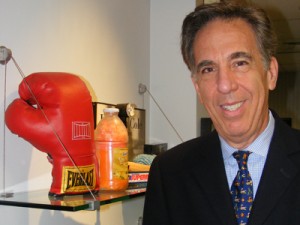Scarsdale firm still thriving at 89
In his slant-ceilinged office with gabled dormer windows in one of downtown Scarsdale”™s Tudor-style buildings, managing partner Howard N. Aronson slid copies of his law firm”™s newsletters across his desk to a visitor. They were written in Japanese, translations by a Japanese employee at Lackenbach Siegel L.L.P.
“No more than 10 to 12 percent, maybe 15 percent, of our clients are New York,” said Aronson, managing partner at the intellectual property boutique firm founded in 1923 in Manhattan. The firm grew its patents and trademark business on the foundation of New York”™s fashion industry, from women”™s undergarments in its earlier years to designer licensing in the 1970s.

The 15-attorney practice since the 1980s has been headquartered at One Chase Road in Scarsdale, the former home of Mead”™s Department Store, renamed the Lackenbach Siegel Building by a landlord grateful for his anchor tenant”™s stable, 10,000-square-foot presence.
The newsletters, both in English and Japanese, testify to the 38-employee firm”™s international reach and its range of clients across industries, from fashion, music and entertainment to automotive, pharmaceuticals and hardware and cutlery manufacturing. Russia, in its transition from the state economy of the fading Soviet Union to privatized capitalism, proved a 10-year wasted effort for the Scarsdale firm, but that was an exception to a history of success that began in the silent-movie era and continues in the digital age, with its new battlegrounds for holders of intellectual property and their attorneys. Internet and web domain-related legal issues now account for about 20 percent of the firm”™s business.
In Japan, Lackenbach Siegel is retained by both “monster clients” and the firm”™s  “mainstay” middle-market companies, said Aronson, who travels there on business at least once a year. The corporate giants include Mitsubishi, Hitachi and Caseo, which have tapped the Scarsdale firm for trademark searches, and Shiseido Co. Ltd., the world”™s oldest and fourth-largest cosmetics company and a 30-year client whose dramatically edgy fashion-photo advertising hangs on the firm”™s hallway walls.
The IP firm also represents the South Korean automotive giant, Hyundai Motor Co. Aronson said the firm spent more than two years in trademark work to pave the way for Hyundai”™s rollout of its Genesis luxury car.
“We”™ve probably searched for Hyundai 200 or 300 names over the last 25 years,” he said.
“It”™s astonishing what runs through this office for trademark searching.”
Closer to home, Lackenbach Siegel does patent searches for Allstar Products Group in Hawthorne, the direct response marketer whose consumer product brands include Snuggie, the sleeved blanket that has become a top-selling cultural phenomenon.
Aronson, who joined the firm in 1978 after being assured by partners “they”™d give me enough rope to hang myself” in practicing intellectual property law, annually ranks among the top 10 attorneys in the nation in the number of trademark applications filed with the U.S. Patent and Trademark Office.
In the ”˜70s, the firm grew and prospered as fashion designers turned to large-scale brand licensing. Its industry clients past and present include Geoffrey Beene, Bill Blass, Anne Klein, Emilio Pucci, Diane von Furstenberg “and a whole boatload of secondary designer names,” said Aronson. The firm did the first trademark work for the Nautica clothing brand.
“We”™re very, very big in the shoe industry,” said Aronson. Those clients include Kenneth Cole and Nina Shoes.
“Tons and tons of designers came through this small, sleepy little Scarsdale law office,” he said.
For several decades, the firm served the fashion industry and other clients from a midtown Manhattan office. The Scarsdale location was a convenience for founding partner Armand Lackenbach, who lived in one of Westchester”™s Sound Shore communities. Lackenbach also liked the downtown office rent in sleepy Scarsdale – $9 a square foot.
“We put a runner on the train twice a day to run files back and forth” between the city and suburban offices, Aronson said.
The firm in 1985 closed its office outside Washington, D.C., as the federal patent and trademark office began its conversion to online recordkeeping. “It was no longer a logistical necessity,” said Aronson. The firm closed its midtown office “at some point when the rent disparity became so bizarre” between Manhattan and Scarsdale, he said.
The managing partner said the IP firm today is debt-free and “completely stable. Those clients that have survived the economy are the stronger ones, so we have stronger clients.”
Lackenbach Siegel”™s sound financial health defies prevailing trends in the legal industry in the economic downturn. “There were 100-year-old law firms that are now out of business,” Aronson said.”My industry was decimated. Law firms generally, some of them very old firms that survived the Great Depression but didn”™t survive ”™08.”
His Scarsdale firm”™s institutional history precedes the Great Depression. “We”™re here 88 years because we do the right things” in relations with clients, said Aronson. “We count our clients in decades, not in years.”